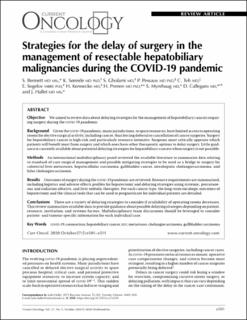| dc.contributor.author | Bennett, Sean | |
| dc.contributor.author | Søreide, Kjetil | |
| dc.contributor.author | Gholami, Sepideh | |
| dc.contributor.author | Pessaux, Patrick | |
| dc.contributor.author | Teh, Catherine S.C. | |
| dc.contributor.author | Segelov, Eva | |
| dc.contributor.author | Kennecke, Hagen Fritz | |
| dc.contributor.author | Prenen, Hans | |
| dc.contributor.author | Myrehaug, Sten D. | |
| dc.contributor.author | Callegaro, Dario | |
| dc.contributor.author | Hallet, Julie | |
| dc.date.accessioned | 2021-05-28T15:05:30Z | |
| dc.date.available | 2021-05-28T15:05:30Z | |
| dc.date.created | 2020-11-19T11:25:18Z | |
| dc.date.issued | 2020 | |
| dc.Published | Current Oncology. 2020, 27 (5), e501-e511. | |
| dc.identifier.issn | 1198-0052 | |
| dc.identifier.uri | https://hdl.handle.net/11250/2756929 | |
| dc.description.abstract | Objective: We aimed to review data about delaying strategies for the management of hepatobiliary cancers requiring surgery during the covid-19 pandemic. Background: Given the covid-19 pandemic, many jurisdictions, to spare resources, have limited access to operating rooms for elective surgical activity, including cancer, thus forcing deferral or cancellation of cancer surgeries. Surgery for hepatobiliary cancer is high-risk and particularly resource-intensive. Surgeons must critically appraise which patients will benefit most from surgery and which ones have other therapeutic options to delay surgery. Little guidance is currently available about potential delaying strategies for hepatobiliary cancers when surgery is not possible. Methods: An international multidisciplinary panel reviewed the available literature to summarize data relating to standard-of-care surgical management and possible mitigating strategies to be used as a bridge to surgery for colorectal liver metastases, hepatocellular carcinoma, gallbladder cancer, intrahepatic cholangiocarcinoma, and hilar cholangiocarcinoma. Results: Outcomes of surgery during the covid-19 pandemic are reviewed. Resource requirements are summarized, including logistics and adverse effects profiles for hepatectomy and delaying strategies using systemic, percutaneous and radiation ablative, and liver embolic therapies. For each cancer type, the long-term oncologic outcomes of hepatectomy and the clinical tools that can be used to prognosticate for individual patients are detailed. Conclusions: There are a variety of delaying strategies to consider if availability of operating rooms decreases. This review summarizes available data to provide guidance about possible delaying strategies depending on patient, resource, institution, and systems factors. Multidisciplinary team discussions should be leveraged to consider patient- and tumour-specific information for each individual case. | en_US |
| dc.language.iso | eng | en_US |
| dc.publisher | MDPI | en_US |
| dc.rights | Navngivelse 4.0 Internasjonal | * |
| dc.rights.uri | http://creativecommons.org/licenses/by/4.0/deed.no | * |
| dc.title | Strategies for the delay of surgery in the management of resectable hepatobiliary malignancies during the COVID-19 pandemic | en_US |
| dc.type | Journal article | en_US |
| dc.type | Peer reviewed | en_US |
| dc.description.version | publishedVersion | en_US |
| dc.rights.holder | Copyright 2020 Multimed Inc. | en_US |
| cristin.ispublished | true | |
| cristin.fulltext | original | |
| cristin.qualitycode | 1 | |
| dc.identifier.doi | 10.3747/co.27.6785 | |
| dc.identifier.cristin | 1849747 | |
| dc.source.journal | Current Oncology | en_US |
| dc.source.40 | 27 | |
| dc.source.14 | 5 | |
| dc.source.pagenumber | 501-511 | en_US |
| dc.identifier.citation | Current Oncology. 2020, 27 (5), 501-511 | en_US |
| dc.source.volume | 27 | en_US |
| dc.source.issue | 5 | en_US |

